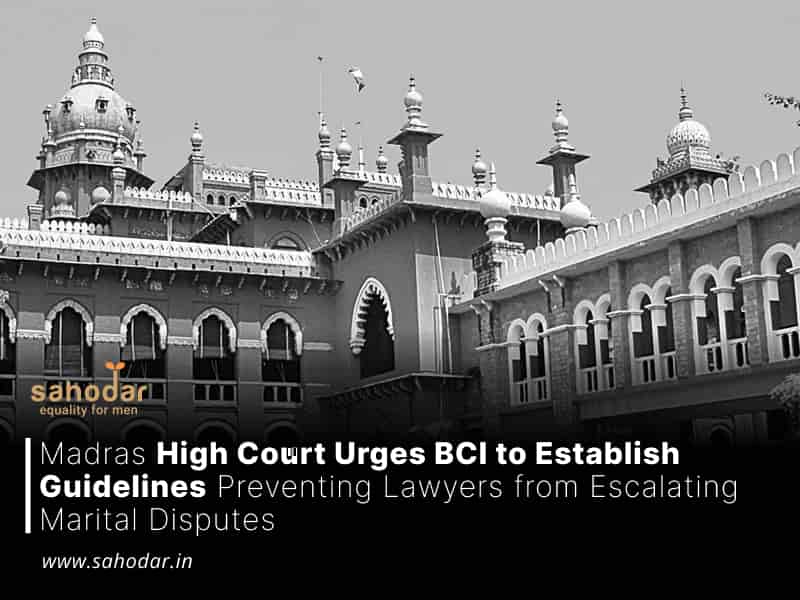The Court has asked the Bar Council of India to formulate guidelines for lawyers so that their efforts are focused on helping save marriages, not breaking them.
The Madras High Court recently urged lawyers not to “add fuel to the fire” in marital disputes.
Justices Bhavani Subbaroyan and KK Ramakrishnan made this point while reviewing a case where a lawyer’s affidavit worsened tensions between a separated couple.
The Court criticized the lawyer’s actions, stating that lawyers should try to help save marriages, not worsen conflicts.
“The duty of the advocate in these types of matters is not to blow the incident out of proportion and thereby cause turbulence to the matrimonial life. The legal profession is for resolving the controversies between parties in the case of matrimonial dispute. The legal profession is for resolving the controversies between parties in the case of matrimonial dispute. The advocate should try to make the marriage and not to break it. The advocate should be a builder, not a destroyer. The advocate should not play spoil sport,” the Court said.
The Court outlined some suggested guidelines to encourage lawyers to focus on resolving marital disputes rather than intensifying conflicts or contributing to marital breakdowns.
Additionally, it urged the Bar Council of India (BCI) to establish guidelines along these lines, ensuring that lawyers handle matrimonial cases without “adding fuel to the fire.”
The guidelines suggested by the Court are as follows:
- Advocates should follow ethical standards whenever the parties solicit their advice.
- Advocates should never misguide the parties.
- Advocates should never give unprofessional advice so as to implicate the persons who are not even remotely connected to the alleged occurrence.
- Advocates should hear the client and try to advise to go for amicable settlement if possible, since it involves life of two individuals, more to say a family.
- Advocates can get the help of qualified counsellor and get a report so as to give proper advice to the party.
- Advocates should get the instructions from the client in writing as to the incidents alleged.
- Advocates should dissuade the client from roping the persons who they feel are not in anyway even remotely connected to the alleged occurrence.
- Advocates should inform the client about the legal consequences they would face if they give false complaint against the persons unconnected to the alleged incident.
- Advocates should refrain from helping the party by informing the police to arrest the persons.
- Advocates should play a neutral role and try their best to resolve the issues between husband’s family and wife’s family.
- In case if the party is hell-bent on giving false complaint so as to make the opposite party surrender to her whims and fancies, the advocates can play a pro active role to send them away to have a rethink.
- If any advocate does any thing unprofessional and unethical while drafting complaint or filing cases and if it comes to the notice of Bar Council, severe action is to be taken.
The Court was considering a woman’s appeals against a family court’s decision, which had granted her husband’s divorce request while denying her request for the restoration of conjugal rights.
The couple, married in 2009, had experienced increasing marital disputes. According to the husband, tensions arose when the wife allegedly pressured her father-in-law for a property division, frequently threatened self-harm, and neglected their child.
The wife refuted these claims, asserting that she was compelled to leave the marital home due to the cruelty she endured there. She opposed her husband’s divorce petition and sought an opportunity to reconcile their marriage.
While the divorce proceedings were ongoing in family court, her relatives allegedly attacked the husband’s family, leading to his father’s death and causing injuries to both him and his mother.
Under these circumstances, the husband argued that reconciliation with his wife was impossible. The family court accepted his position and granted the divorce.
When the wife appealed this decision, the High Court also concurred, concluding that the marriage had irretrievably broken down.
“When there is allegation of the intentional murder of the father of husband under his nose and during the intervention, he and his mother also sustained grievous injuries, it would be a inhuman approach to ask him to forget the past as a bad dream and to live with her and to keep a conducive matrimonial home,” the Court said.
The Court observed that after the husband filed for divorce, the wife initiated a criminal case accusing him and her in-laws of cruelty, which ultimately resulted in an acquittal. The Court concluded that her actions had irreparably damaged the marriage, leading it to dismiss her appeals.

